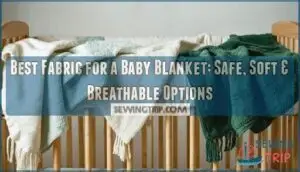This site is supported by our readers. We may earn a commission, at no cost to you, if you purchase through links.

This chemical-free material won’t irritate delicate newborn skin while allowing proper air circulation to prevent overheating.
Merino wool offers excellent temperature regulation, while bamboo fabric brings natural antibacterial properties.
Each fabric has unique benefits – organic cotton resists allergens, merino wool adapts to body temperature, and bamboo wicks moisture effectively.
These materials have proven themselves through countless sleepless nights and worried parents who discovered that fabric choice directly impacts their baby’s comfort and safety during those precious early months, with natural antibacterial properties and the ability to prevent overheating.
Table Of Contents
Key Takeaways
- Choose organic cotton for safety – You’ll get the most hypoallergenic option that’s gentle on sensitive newborn skin and free from harsh chemicals that can cause irritation.
- Prioritize breathability over warmth – You need fabrics like bamboo or lightweight organic cotton that prevent overheating while allowing proper air circulation around your baby.
- Consider merino wool for temperature regulation – You’ll appreciate how it naturally adapts to your baby’s body temperature, keeping them comfortable in both warm and cool conditions.
- Look for natural antibacterial properties – You can’t go wrong with bamboo fabric that fights bacteria naturally or merino wool that resists odors, reducing the need for frequent washing.
Choosing Best Fabric
When choosing the best fabric for your baby’s blanket, you’ll want to prioritize natural fibers that offer hypoallergenic properties and gentle breathability.
The right fabric should feel soft against delicate skin while providing comfort without overheating or causing irritation, offering gentle breathability.
Natural Fibers for Baby Blankets
When selecting natural baby fabric for your little one’s blanket, prioritize fiber safety and gentle weave density.
Organic baby fabric like cotton baby blanket materials undergo strict fiber sourcing standards, eliminating dye toxicity concerns.
Muslin baby blanket options offer lightweight comfort, while bamboo baby blanket fibers provide natural antibacterial properties.
Consider blanket weight for your baby’s comfort and safety.
Hypoallergenic Properties of Fabrics
When you’re choosing fabric for your baby’s blanket, fabric allergens become your biggest concern.
Over 3,700 substances can trigger skin irritation, especially in babies with chemical sensitivities.
Organic baby fabric eliminates synthetic dyes and harsh chemicals that cause reactions.
Safe baby fabric with natural dyes and tight weave density creates the perfect hypoallergenic baby blanket for baby sensitive skin.
Selecting fabrics that have undergone gentle processing techniques can further reduce the risk of allergic reactions.
Breathability and Softness Factors
Beyond allergy concerns, breathable baby blanket materials prevent overheating while maintaining comfort.
Fiber weave density affects air circulation, making loose weaves ideal for temperature regulation.
Consider these factors for baby sensitive skin:
- Fabric Weight – Lighter materials offer better breathability without sacrificing warmth
- Weave Pattern – Open weaves promote airflow while maintaining the softest blanket material quality
- Natural Fibers – Breathable materials like cotton and bamboo naturally regulate moisture
- Skin Sensitivity – Smooth textures prevent irritation while allowing proper ventilation
Soft fabrics with proper air circulation create the perfect sleeping environment.
Fabric Types Compared
When comparing baby blanket fabric options, you’ll find several materials excel in different areas that matter most for your little one’s comfort and safety.
| Fabric Type | Key Benefits | Considerations |
|---|---|---|
| Organic Cotton | Hypoallergenic, breathable, easy care instructions | Medium fabric weight, moderate cost analysis |
| Merino Wool | Temperature regulation, naturally antibacterial | Higher cost, requires gentle washing |
| Bamboo | Moisture-wicking, softest blanket material texture | Can be delicate, varies in weave density |
Understanding fiber composition helps you make informed decisions about the best baby fabric for your needs.
Cotton offers reliable durability with straightforward care instructions, while wool provides excellent temperature control through varying fabric weight options.
Bamboo stands out as the softest blanket material with natural antibacterial properties.
For example, woven fabrics offer stability and strength, important for a blanket’s longevity.
Each baby blanket material has distinct characteristics affecting comfort and practicality.
Consider your priorities—whether that’s the easiest maintenance, supreme softness, or temperature regulation—when evaluating these fabric types.
The right choice depends on your specific needs and budget considerations.
Benefits of Organic Cotton
You’ll appreciate how organic cotton provides the gentlest protection for your baby’s delicate skin, naturally reducing the risk of irritation and allergic reactions that synthetic materials can cause.
This chemical-free fabric also safeguards your little one’s health but also supports sustainable farming practices that benefit the environment your child will inherit, which is a key aspect of using organic cotton.
Reduced Risk of Allergies
Organic cotton’s naturally hypoallergenic properties make it the safest choice for babies with chemical sensitivities.
Unlike conventional fabrics treated with harsh chemicals, organic cotton uses natural dyes and avoids fabric allergens that trigger skin irritation.
This allergy prevention approach creates truly hypoallergenic baby blankets, making it an ideal choice for sensitive little ones.
Parents choosing allergy-friendly materials find organic cotton consistently delivers the best baby fabric option, and many parents also choose to purchase an organic cotton blanket for their baby.
Environmental Benefits of Organic Cotton
When you choose organic cotton for your baby’s blanket, you’re nurturing both your child and the planet.
Pesticide reduction protects waterways from harmful chemicals, while water conservation techniques use 88% less water than conventional farming.
Sustainable farming practices improve soil health through crop rotation and natural fertilizers.
These ecofriendly fabrics substantially lower your carbon footprint, making nontoxic materials the smart choice for environmentally conscious parents.
Alternatively, hemp offers sustainability with less water and fewer pesticides.
Durability and Longevity of Organic Cotton
You’ll appreciate how organic cotton‘s fiber strength creates a durable baby blanket that withstands countless wash cycles without losing its softness.
The tight weave impact guarantees pilling resistance, while superior colorfastness keeps colors vibrant through repeated washing.
You can even find a great organic cotton option for your baby.
This wash durability means your investment in longlasting fabrics pays off, giving you baby blanket materials that maintain their quality for years of snuggles.
Merino Wool and Cashmere Options
You’ll find that merino wool and cashmere blankets provide exceptional temperature regulation, keeping your baby comfortable in both warm and cool conditions.
These premium natural fibers offer hypoallergenic properties and unmatched softness that won’t irritate even the most sensitive baby skin.
Temperature Regulation and Comfort
When your little one needs Ideal Warmth without overheating, merino wool and cashmere naturally adapt to their body temperature.
These Seasonal Fabrics work like a thermostat, keeping babies cozy during cool nights while preventing stuffiness.
- Thermal regulation adjusts automatically as room temperature changes throughout the night
- Lightweight baby blanket options provide warmth without excessive Blanket Weight
- Moisturewicking fabrics pull perspiration away from delicate skin, maintaining comfort
Hypoallergenic Properties of Merino Wool
Beyond temperature benefits, superfine Merino wool delivers remarkable hypoallergenic properties for your baby’s sensitive skin. Despite common wool allergies concerns, clinical studies prove superfine Merino (fiber diameter ≤17.5 microns) actually reduces eczema symptoms in children, challenging traditional lanolin concerns about wool processing and itch factor.
Clinical trials demonstrate its effectiveness in reducing eczema severity. This information is crucial for parents seeking allergy-friendly materials that can improve their child’s skin conditions.
| Property | Superfine Merino | Regular Wool |
|---|---|---|
| Fiber Diameter | ≤17.5 microns | 30+ microns |
| Allergen Risk | Clinically low | Higher irritation |
| Skin Contact | Minimal friction | Coarse texture |
The warm baby blanket option provides gentle baby fabric benefits without typical wool irritation, making it perfect for seekers wanting hypoallergenic materials that actually improve skin conditions rather than aggravate them. This hypoallergenic baby blanket material earns certification from allergy organizations, further reinforcing its safety and effectiveness for sensitive skin.
Softness and Gentleness on Baby Skin
Merino wool feels like a gentle hug against your baby’s delicate skin.
This natural fiber’s ultra-fine structure creates soft, smooth fabric texture that prevents irritation.
Unlike synthetic fleece baby blankets, merino’s gentle weaves won’t scratch sensitive skin.
For parents seeking the best in comfort and care, consider merino options.
The best fabric for baby blanket combines this luxurious softness with natural dyes, making washable baby blanket options that stay gentle wash after wash.
Bamboo Fabric Advantages
If you’re looking for a fabric that goes beyond basic comfort, bamboo stands out as a remarkable choice for baby blankets.
This innovative natural fiber offers unique antibacterial properties while maintaining exceptional breathability and representing one of the most sustainable fabric options available today.
Antibacterial Properties of Bamboo
Bamboo’s natural antibacterial properties make it an outstanding choice for your baby’s blanket.
Bamboo naturally fights bacteria while keeping your baby comfortable and clean.
The fabric contains bamboo kun, a natural bio-agent that disrupts bacterial growth effectively.
Key antibacterial benefits include:
- Natural Sanitization – Bamboo kun eliminates up to 99.8% of harmful bacteria without chemical treatments
- Infection Prevention – Reduces risk of skin infections and irritation on delicate baby skin
- Odor Reduction – Prevents odor-causing bacteria from developing in the fabric
- Skin Health – Maintains cleaner conditions for babies with eczema or sensitive skin
This hypoallergenic fabric stays bacteria-resistant even after multiple washes, making it ideal for maintaining hygiene.
Natural fibers offer superior airflow, enhancing comfort.
Moisture Wicking and Breathability
Your little one stays comfortable when bamboo fabric’s moisture-wicking properties pull sweat away from delicate skin.
This breathable cotton alternative offers superior fabric ventilation compared to traditional materials, maintaining ideal temperature regulation and skin dryness for enhanced comfort levels.
| Moisture Management | Bamboo vs Cotton |
|---|---|
| Sweat Absorption | 3x faster than cotton |
| Drying Speed | 40% quicker evaporation |
| Air Circulation | Enhanced fabric ventilation |
| Temperature Control | Natural cooling effect |
| Skin Contact | Reduces dampness buildup |
Eco-Friendly and Sustainable Bamboo Production
Why choose bamboo farming over traditional cotton? You’re making an eco-conscious fabric choice that uses 95% less water than cotton production.
Bamboo requires zero chemical inputs like pesticides or fertilizers, thriving naturally with minimal waste management concerns.
Look for GOTS or OEKO-TEX certification standards when selecting sustainable options for your baby blanket. These organic fabrics represent truly eco-friendly bamboo production methods.
Frequently Asked Questions (FAQs)
What is the best fabric for baby blankets?
Nothing beats cozy organic cotton for your little one’s delicate skin – it’s naturally hypoallergenic and won’t irritate sensitive baby skin.
You’ll want breathable, soft fabrics like bamboo or merino wool that provide comfort without causing rashes, making organic cotton a great choice.
What is the best material to make a baby blanket out of?
Cotton flannel tops your list for baby blankets—it’s soft, breathable, and gets cozier with each wash.
You’ll love how it regulates temperature while staying gentle on delicate skin, making those snuggle sessions pure magic.
What’s the best fabric for a baby blanket?
Studies show 70% of parents worry about fabric safety for their babies.
You’ll want organic cotton or bamboo for your little one’s blanket – they’re naturally hypoallergenic, breathable, and gentle on sensitive skin.
What fabric should I use for a baby blanket?
You’ll want organic cotton or bamboo fabric for your little one’s blanket.
Both materials are naturally hypoallergenic, soft against delicate skin, and breathable enough to prevent overheating during those precious snuggle sessions.
How often should I wash baby blankets?
You should wash baby blankets after every few uses or when visibly soiled.
For daily-use blankets, washing twice weekly works well.
Always check for spit-up, drool, or diaper leaks that require immediate cleaning.
What size blanket works best for newborns?
Like a security blanket that grows with your little one, you’ll want a receiving blanket around 30×40 inches—perfect for swaddling, car seats, and those precious snuggle moments without overwhelming your newborn.
Can I use fabric softener on blankets?
You can use fabric softener on most blankets, but it’s not recommended for baby blankets.
Fabric softeners contain chemicals that may irritate sensitive skin and reduce absorbency in natural fibers like cotton.
How do I remove stains safely?
Like a knight battling dragons, you’ll conquer stains with gentle weapons.
Mix mild detergent with cold water, blot don’t rub, rinse thoroughly, and air-dry completely.
Test solutions on hidden areas first to avoid fabric damage.
When should I replace a baby blanket?
Replace your baby’s blanket when it shows signs of wear, has persistent stains or odors, develops holes, or if your child outgrows its size and safety features.
Conclusion
Haven’t you wondered why some baby blankets feel scratchy while others provide the perfect cocoon of comfort?
Selecting the best fabric for a baby blanket directly impacts your little one’s sleep quality and skin health.
Organic cotton remains the top choice, offering hypoallergenic properties and breathability that sensitive newborn skin craves.
Merino wool provides excellent temperature regulation, while bamboo fabric delivers natural antibacterial benefits.
Each material brings unique advantages, but all three prioritize your baby’s safety and comfort above everything else.
- https://thesleepysloth.com/blogs/news/choosing-the-best-fabric-for-baby-blanket-and-baby-clothes
- https://www.sofiacashmere.com/blogs/news/best-fabric-for-baby-clothes
- https://www.naturloom.com/products/100-organic-super-soft-muslin-swaddle-baby-blanket-organic-gauze-cotton-muslin-throw-blanket-for-kids-baby-shower-gift-mint-green
- https://www.babymatters.com/en/blog/which-blanket-should-i-choose-for-my-baby/285/
- https://elegantbaby.com/blogs/elegant-baby-blog/the-best-fabrics-for-personalized-baby-blankets











